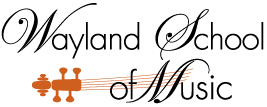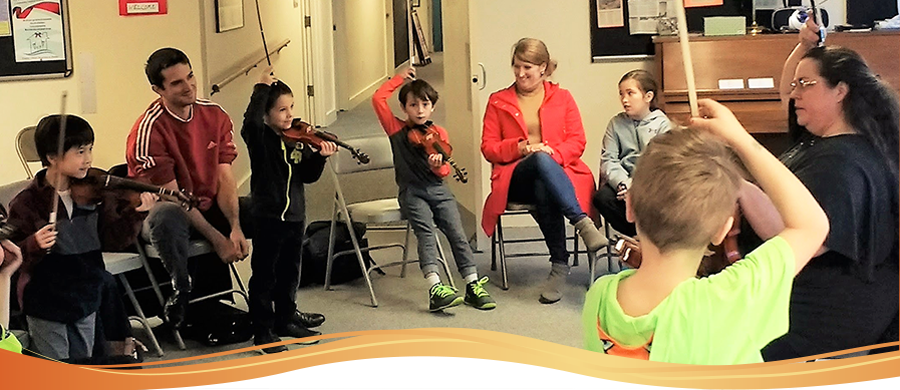Suzuki Program
(For a comparison of Suzuki and traditional approaches, please scroll to the bottom of this page.)
We offer Suzuki instruction in violin, viola, cello, piano, flute and guitar, for students age 3.5 and up. We have several registered Suzuki teachers, offering Suzuki violin/viola instruction up to Book 8, Suzuki piano instruction up to book 4, Suzuki guitar up to book 8, and Suzuki cello and flute instruction up to book 2.
The Suzuki program consists of:
- weekly Suzuki private lessons (on-site or via Zoom)
- twice-monthly Suzuki supplemental group class for your instrument
- play-in and performance event (all instruments) each semester
- parent support event each semester (on zoom)
The private lesson and group class work in tandem. New skills and songs that are learned in the private lesson are reinforced in a fun and collaborative environment in the group class.
Group is integral to the program - and also counts as a day of practice done for you.
"Lessons are where we work, group is where we have fun!"
The first step for prospective Suzuki families is to attend an "Intro to Suzuki for Parents" session, available monthly on zoom.
2026 spring semester dates: Wednesdays Feb 11th, Mar 18th, Apr 29th, May 20th at 8:00pm
Please This email address is being protected from spambots. You need JavaScript enabled to view it. if you have questions, or would like to discuss the best option for your family.
View our Suzuki playlist on YouTube (videos of our group classes and Suzuki students' performances)
Suzuki Program fee includes:
- 18 private lessons per semester (day/time by arrangement)
- Twice-monthly supplemental group class (times below)
- Special play-in event
- Parent support event
Per semester:
Suzuki with 30 min private lesson - $1248
Suzuki with 45 min private lesson - $1689
Suzuki with 60 min private lesson - $2121
(Suzuki with 20 min private lesson, age 3 - 4 only, with certain teachers - $978)
Fees are pro-rated if joining later, for remaining number of lessons and classes.
Twice-monthly supplementary group class times, fall 2025
These classes are for students who are enrolled in the full Suzuki program (lessons + group) only.
For standalone beginner classes, see "Pre-Suzuki" below.
Flute: Fri 5:15 - 6:00, with Ann
Bowed strings: Weds TBD with Lauryn
Piano: Saturdays 2:00 - 2:45 with Sheryl
Guitar: Thursday 5:05 - 5:50 with Francesco
Mixed strings*: Saturdays 1:50 - 2:35 with Zoe
*alternative to bowed strings/guitar classes above
Classes alternate between levels 1 and 2 for your group - 7 classes per semester.
No group class on holiday weekends.
Full schedule available on request.
Students of a non-WSM teacher may join our group with that teacher's written permission.
Pre-Suzuki "taster" (one semester)
For Suzuki violin and guitar, we also sometimes offer a pre-Suzuki-program "taster" option for certain ages, depending on availability:
"Small Group Intro to Violin" and "Small Group Intro to Guitar" are one-semester group (only) classes.
They are a general introduction to each instrument based on Suzuki philosophy and methodology (see below), and are offered through Wayland Recreation - you do not need to be a Wayland resident to register, though.
New groups begin each semester, and families may choose to take this class before transitioning to the full program as above.
For class details, visit our Group Class page. Registration for these classes will open at Wayland Rec on Aug 11th.
Fall 2025 Wayland Rec pre-Suzuki schedule:
Small Group Intro to Guitar, age 6-7 (caregiver attendance encouraged)
Tuesdays @ 5:00 - 5:50, 15 weeks, starting 9/30
Small Group Intro to Violin, age 4.5-6 with caregiver
Saturdays @ 1:00 - 1:45, 14 weeks, starting 9/27
Suzuki Education and Philosophy
More than fifty years ago Japanese violinist Shinichi Suzuki, observing that children the world over learn to speak their native language with ease, began to apply the basic principles of language acquisition to the learning of music. He called his method the mother-tongue approach. The ideas of parent involvement, loving encouragement and constant repetition are some of the special features of the Suzuki approach:
Parent Involvement
Just as parents are naturally involved in their children’s acquisition of language, with the Suzuki method parents are involved in the musical learning of their child. They attend lessons with the child and serve as “home teachers” during the week. Sometimes the parent learns to play before the child, so that they understands better what the child is learning to do.
But no prior musical experience is required of the parent - the teacher will help both parent and child. Parents work with the teacher to create an enjoyable learning environment.
Starting Early
The early years are the time of explosive development in mental processes and muscle coordination. Listening to music may begin at birth; formal training may begin at age three or four, but it is never too late to begin.
Listening
Children learn words by hearing them spoken hundreds of times by others. In the same way, listening to music every day is key, especially listening to pieces in the Suzuki repertoire so that the child absorbs them before ever playing them – just as s/he does with nursery rhymes or advertising jingles!
Repetition
Repetition is a key factor in learning of any kind, including learning an instrument. Children do not learn new words or pieces of music and then discard them. Instead, they add them to their vocabulary or repertoire, gradually using them in new and more sophisticated ways.
Developmentally appropriate curriculum
The Suzuki method is developmentally targeted to young children. Children build strong foundational skills through creative and playful activities alternating between exercises, movement, and song (videos: Parts of the Bow; Mixed Strings class ensemble; finding the E string). Teacher, child and parent work together - no prior experience is needed, as parents learn right along with their child in class and partner with them at home. As the children grow they build on this foundation, transitioning gradually and naturally to increasing mastery and independence in their learning.
What is the difference between Suzuki lessons and traditional private lessons?
At Wayland School of Music we do not believe that one approach is “better” than the other. Above all, the most important factor in your child’s learning is an expert, experienced and enthusiastic teacher who really knows how to connect with children and is a good personal “fit” for your child.
However, the two approaches are different in philosophy and “flavor”, and which to choose depends on which you think will be a better fit for your child and your family. The table below lists some of the differences. Please This email address is being protected from spambots. You need JavaScript enabled to view it. to get started in either method, or if you have further questions.
(Note - a Suzuki method tryout will be in a private lesson format, but serves as a taste of the same methodology used in both private Suzuki lessons and Intro group classes. The teacher will help you decide on the best choice for you.)
|
Traditional lessons |
Suzuki lessons |
|
Generally start at age 5 or 6 and up. |
Can start as young as 3 or 4. |
|
Music reading is usually taught from the beginning stages. |
Music is initially learned by ear through repeated listening to recordings; music reading is added once the child is fluent in the language of music (just as reading builds on oral fluency), and has developed basic technical proficiency. |
|
Parents may attend lessons (and are often encouraged to do so) but are not required to attend. |
Parents are an integral part of the teacher/child/parent “Suzuki triangle”, learn along with their child, and partner with the child at home. No previous experience is required, however! |
|
Parents may help their children practice (and are often encouraged to do so) but are not required to. |
Parents are their child's practice partner at home throughout the early years of lessons. |
|
Lessons are always individual, and the opportunity to play with other children depends on teacher and music school. |
Children are enrolled in both a weekly private lesson and a twice-monthly group class, in an integrated curriculum. Group class provides both social and musical reinforcement for learning. |
|
Teachers choose their own curriculum and materials based on personal preference and approach, which may vary widely. Training and experience may also vary (and should always be thoroughly investigated). |
Teachers follow a standardized curriculum with standardized materials; they have undergone intensive training specific to the Suzuki method, and are registered as having completed that training. NB Be wary of teachers who claim to be "Suzuki based" or "modified Suzuki" unless they also show proof of Suzuki training: merely "using the books" does not make someone a Suzuki teacher! |



